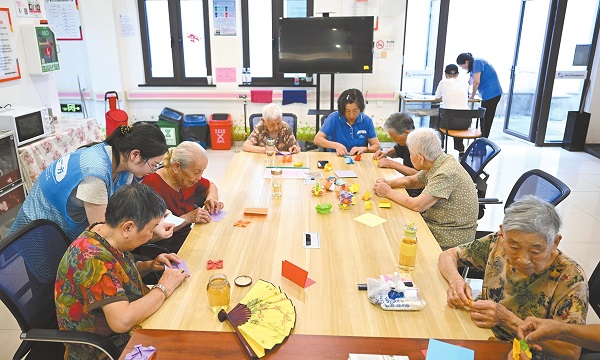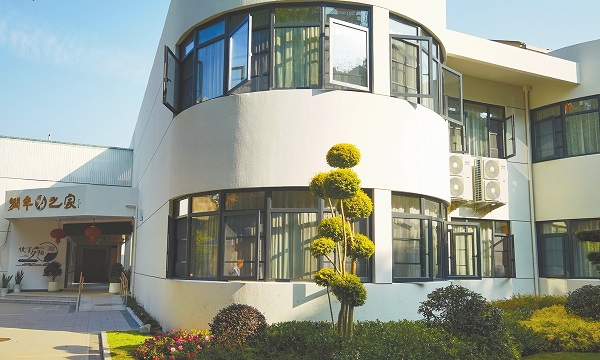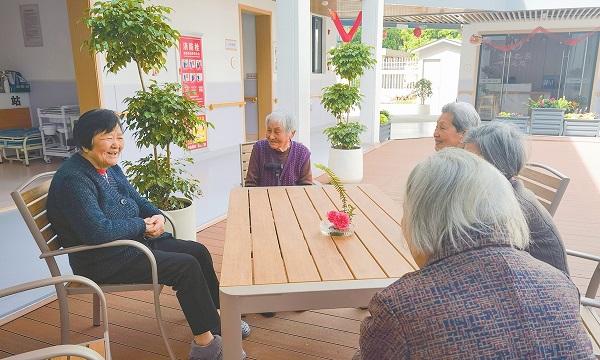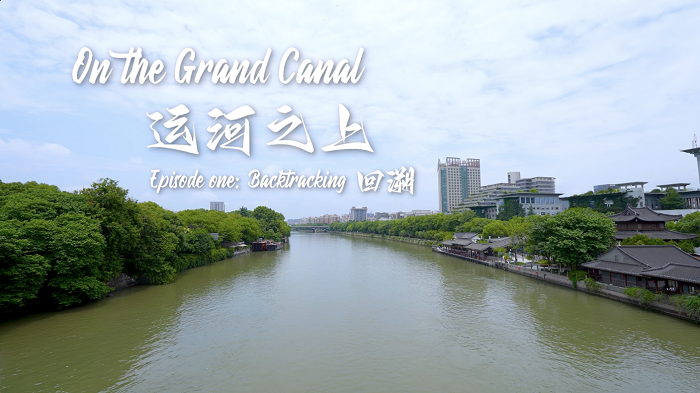private kindergartens in some chinese cities transform into nursing homes

elderly residents participate in a craft-making session at a local nursing home's day care program in hangzhou, east china's zhejiang province, on august 28, 2024. photo: vcg
zhuang yanfang never thought that one day she would lead octogenarians in old patriotic tunes at the same place where she used to sing children's songs with toddlers.
zhuang, 56, was the director of a private kindergarten with a 25-year history in jinhua, east china's zhejiang province. in 2023, facing a prolonged struggle to enroll enough children, zhuang made a difficult decision - she closed her kindergarten and transformed it into a nursing home. the once lively building and playground filled with running children are now home to the elderly in need of better care.
in recent years, with the conditions of public kindergartens continuing to improve, an increasing number of parents chose to send their children to public kindergartens instead of private ones. the teaching faculty, hardware facilities, and cost performance of the public kindergartens have largely surpassed private institutions.
"private kindergartens were born, when the capacity of public kindergartens was insufficient and the society needed differentiated services," she told the global times. "now, i feel that private kindergartens have fulfilled their 'historical mission.'"
zhuang thus decided to embrace the transition and renovated her kindergarten to a nursing home. besides, some private kindergartens in various chinese cities, such as shenzhen, taiyuan, and jinan, also reported to have tried this creative model of offering nearby elderly residents care services.
chinese demographers and sociologists reached by the global times view this transition as a forward-thinking measure, which could also help stimulate growth in the flourishing silver economy.
make up mind

an exterior view of the elderly people's home "run nian zhi jia" in jinhua, east china's zhejiang province, which used to be a private kindergarten photo: courtesy of zhuang yanfang
in 1998, zhuang opened beiyuan no.1 kindergarten, which gradually became one of the most popular private kindergartens there in the following years. "there were nearly 300 kids at its peak," recalled zhuang.
but things have changed in recent years. according to data released by china's national bureau of statistics, there were nearly 5.35 million fewer kindergartners in 2023 than in the previous year.
"in 2023, there were only some 60 kids at our kindergarten," sighed zhuang.
zhuang finally made up her mind to turn this kindergarten into a nursing home. she visited many elderly care institutions for the aged across zhejiang and in nearby shanghai, and decided to combine high-end service with affordable prices.
the alteration work started in july 2023 after the last batch of children graduated. it lasted four months, turning the previous classrooms into bedrooms for the elderly, and installing an elevator, armrests, ship-and-galley tiles, and an alarm system. for those with mobility problems, zhuang equipped all the bathrooms with portable seats, and added emergency buttons to the bedsides.
zhuang named her new nursing home "run nian zhi jia," literally "a home of nourishing life." it has double, triple, and quadruple rooms, charging 4,000-6,000 yuan ($563-844) per month. for those who return to their homes at night, the monthly fee is 2,800 yuan, said zhuang.
the home started trial operations in december 2023. now there are 10 people living there, all aged above 80.
ye hong is one of them. ye, in his 90s, moved to the nursing home in april. his daughter ye min recalled that they had visited some five old people's homes across the city, which were either crowded or had little public activity space. "finally, we found this; it was spacious and bright," she said. "now my father looks in a better mood here."
a guideline on boosting high-quality development of service consumption, which the state council unveiled in august, called for supporting the development of the silver economy and improvement of at-home and community elderly care services.
located in a residential community, zhuang's nursing home has received much support from the local government, social organizations, and other companies.
apart from financial aid for alteration costs, a geriatrician designated from a local public hospital would conduct a free on-site clinic at the nursing home every wednesday.
"we also have volunteers from universities and companies, who regularly come to talk to and play games with the elderly," zhuang told the global times.
in 2023, jinhua's township-level beiyuan subdistrict, where zhuang's nursing home is located, was listed as a transformation pilot project of the local government's "future community" project. the project mainly focuses on offering all-age-friendly facilities and services to local residents, particularly senior citizens and children.
under the project, zhuang said half of her renovation expenses were covered by a government-backed construction company, and the grassroots officials of the beiyuan subdistrict offered guidance and helped in the renovation.
"it is a joint effort by all sides," she noted.
a second life

senior residents chat in the yard of "run nian zhi jia" elderly people's home. photo: courtesy of zhuang yanfang
how to better serve the elderly, bringing compassionate healthcare and warm interpersonal interactions into their daily lives, is a question that newcomers in the elderly care industry think about every day.
zhuang shared some elderly university-like courses that her nursing home offers, such as traditional chinese realistic painting. attending these courses enables the elderly to gain a sense of achievement, zhuang said. "they feel that these things give them a second life."
interestingly, many people who have spent time in both preschool education and elderly care told the global times that, looking after the elderly and children are quite similar. at run nian zhi jia, courses like painting, intelligent games, and physical exercise are what zhuang's previous kindergarten had.
zhang, a former kindergarten teacher now working at a nursing home in northwest china's shaanxi province, also noted the significance of providing emotional value to the elderly.
"[i] encourage them like encouraging little children," zhang told the global times. "when they participate in an activity, when they are persuaded to eat a dish that they don't like but is healthy, i would give them oral encouragement and praise. i would softly say, if you finish this bowl of rice, or if you exercise well today, i will give you a piece of chocolate."
on china's lifestyle platform xiaohongshu, or little red book, zhang shares videos of her daily work at her nursing home. in the most-viewed video, she stands in front of a dozen elderly people in chairs or wheelchairs, and leads them to make simple gestures along with the music, such as clapping and waving hands. the music is a very popular children's song that probably most chinese kindergartens have played.
a new model
similarly, on friday, a kindergarten in south china's guangdong province was transformed into a "university" for the elderly, welcoming more than 10 trial students aged above 50, a local newspaper reported.
prior to that, some private kindergartens in the cities of shenzhen, taiyuan, and jinan, reported to have tried this creative model of offering nearby elderly residents care services.
these vivid cases echo the central government's continuous work in further promoting elderly care development in recent years. a document the general office of the state council issued in december 2020 called for efforts to build a system that combines home-based services with community agencies, medical services with nursing care, and the creation of a social atmosphere of respecting, loving, and helping the elderly.
in addition to being directly converted into elderly care homes, some private kindergartens and government-built community service centers across china are also exploring a new approach to taking care of both the elderly and children, providing a considerate "one-stop solution" to two of the biggest challenges face by some local families and working couples.
"grandpa, you're not dancing right; you should lift your left foot!" on the lawn of a childcare center in shenzhen, south china's guangdong province, some senior citizens and children line up and dance to the beat, with the children's innocent corrections creating hearty laughter among the elderly. the childcare center is open to both groups, lightening the elderly care and childcare burdens of busy working families, the workers' daily reported on june 15.
in zhejiang's anji county, a 1,800-square-meter service center specifically for the elderly and children is located at lingfeng subdistrict. the new service center, with assistance from local childcare service constitutions and hospitals, provides professional nursery and elderly care services, and regularly organizes parent- and grandparent-child activities, the global times learned.
"i go to the center almost every week with my grandson," said a local resident surnamed chen. "when he is building blocks and playing games there, i chat and play chess with other elderly people. we both feel very happy," chen told the global times.
at the center, the living and learning areas for the elderly and children are relatively independent, but the outdoor space is shared by both groups, said the center staffers. when the two groups with great age differences participate in the same outdoor activities, an interesting chemistry filled with warm laughter usually happens, becoming a catalyst for the harmonious relations between generations.
demographer zhou haiwang predicted that the "transformation wave" won't happen in the near future, particularly in big cities, as nursing homes have not been in short supply in recent years.
zhou, who is deputy director of the institute of population and development at shanghai academy of social sciences, hailed that the transition provides a progressive solution for modern needs. "it can better deploy the existing social public service resources in childcare, education, and elderly care, and improve their utilization efficiency, so as to better serve the people," he told the global times.
-
7th hangzhou international day kicks off
september 6, 2024
-
zhejiang olympians return to hangzhou, inspire students
september 4, 2024
-
hangzhou cyclist li zhangyu wins china's first gold at paris paralympics
august 30, 2024

